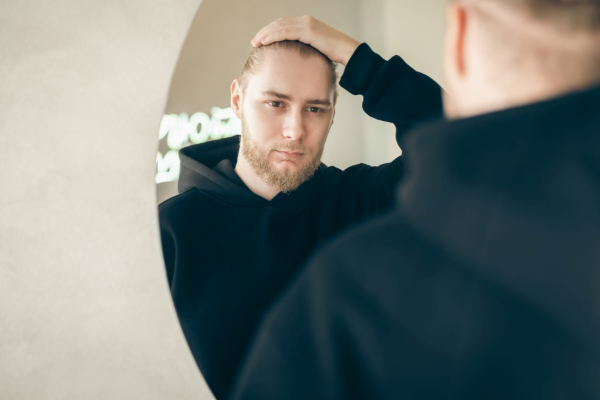13 June 2025
Understanding Male Hair Loss: Can It Be Prevented, Stopped, or Reversed?
Hair loss is a reality many men face, but understanding your options can empower you to take proactive steps. While it may not be possible to prevent all forms of hair loss, there are numerous strategies available to slow its progression or even reverse its effects. Let’s explore these strategies in detail, focusing on prevention, stopping hair loss, and potential reversal.
Before you take action, it helps to understand what’s causing your hair loss and what’s considered normal. From genetics to hormones and lifestyle factors, there’s more to hair loss than meets the eye. Read our guide to the causes of male hair loss.
Prevention Tips: Laying the Foundation for Healthy Hair
Preventing hair loss starts with creating an environment that supports robust hair growth. Here’s how you can fortify your hair health:
1. Balanced Diet for Optimal Hair Health
Your hair needs proper nutrition to thrive. A diet rich in essential vitamins and minerals helps maintain healthy hair follicles and supports the growth cycle. Key nutrients include:
Biotin: Known for strengthening hair and promoting growth.
Zinc: Plays a vital role in hair tissue growth and repair.
Iron: Supports the delivery of oxygen to hair follicles, which is crucial for their health.
Incorporating foods such as leafy greens, lean meats, eggs, nuts, and seeds can provide these nutrients. If your diet is lacking, supplements may help fill the gaps.
2. Managing Stress Effectively
Chronic stress can lead to increased hair shedding and weakened hair follicles. High cortisol levels, a stress hormone, can disrupt the hair growth cycle. Adopting stress-relieving practices can help:
Meditation: Helps calm the mind and reduce cortisol levels.
Yoga and Exercise: Improves blood circulation and overall well-being, supporting hair growth.
Deep Breathing Exercises: Simple techniques that you can incorporate daily to foster relaxation.
3. Using Specialised Hair Products: HLCC and Mediceuticals Hair Products
Formulated products designed to address male hair loss can be a beneficial addition to your routine. Brands like Mediceuticals and HLCC products offer shampoos, conditioners, and hair and scalp treatments that strengthen hair and reduce DHT’s impact—a primary factor in male pattern baldness.
4. Incorporating DHT Inhibitors
Dihydrotestosterone (DHT) is a hormone that contributes to hair follicle shrinkage. Supplements from HLCC can lower DHT levels and help protect the follicles from damage, preserving hair density and reducing further thinning.
5. Regular Specialist Visits
Routine check-ups with a hair loss specialist provide tailored advice and professional treatments. Specialists can monitor changes and adjust prevention strategies as needed, ensuring you’re on the right path.
Stopping Hair Loss: Targeted Solutions for Progression Control
If you’ve already noticed signs of hair thinning, it’s essential to act quickly. Stopping hair loss in its tracks often requires a multi-pronged approach:
1. Early Intervention
Seeking help early can make a significant difference. A specialist can assess your hair loss stage and recommend effective treatment options before more follicles become inactive.
2. Topical Treatments
Minoxidil (a topical solution) and finasteride (a prescription oral medication) are two of the most well-documented treatments for slowing hair loss. Minoxidil helps by prolonging the growth phase of hair, while finasteride reduces DHT levels, preventing further follicle damage.
3. Derma Rollers & Scalp Stimulators
Derma rollers work by creating micro-injuries to the scalp, which boosts blood circulation and stimulates hair follicles to promote growth. Scalp stimulators can help blood flow to the follicles. Used regularly, they can complement other hair loss treatments.
4. DHT-Inhibiting Sprays
Products such as Mediceuticals Numinox help block DHT at the scalp level, preventing further loss while nourishing follicles to encourage new growth.
Reversing Hair Loss: Advanced Treatments for Lasting Results
For more advanced cases, where hair has already thinned or bald patches have formed, reversing hair loss might be the goal. Here are some effective options:
1. Hair Transplants
Hair transplants involve taking healthy hair follicles from one part of the scalp (usually the back or sides) and transplanting them to areas with thinning or no hair. This procedure can significantly improve appearance and confidence but needs proper after care.
2. DNA Testing for Personalised Treatment
Understanding your unique genetic makeup can guide treatment decisions. Personalised DNA testing can pinpoint specific predispositions and help create a targeted treatment plan that maximises your results.
3. Low-Level Laser Therapy (LLLT)
This non-invasive treatment uses laser light to stimulate hair follicles, improve blood flow, and encourage hair growth. LLLT can strengthen existing hair and foster regrowth by energising dormant follicles.
4. Commitment to Consistent Care
Reversing hair loss isn’t an overnight fix—it requires a long-term commitment to a consistent hair care routine. Following the advice of professionals and sticking to your treatment plan is essential for optimal results.
Key Takeaways for Managing Male Hair Loss
Common Yet Manageable: While genetics play a major role in hair loss, factors like stress, diet, and scalp health are also significant.
Act Early: Taking action at the first signs of thinning can yield better results and help maintain more of your natural hair.
Seek Expert Help: Consulting with specialists provides access to tailored treatments and advice, maximising the chances of success.
Final Thoughts
Hair loss can be a challenging experience, but it doesn’t have to be overwhelming. With a clear understanding of your options and a proactive approach, it’s possible to maintain, slow down, or even reverse hair loss. Positive changes are within reach when you commit to the right strategy for your hair and scalp health.
If you’re looking for more personalised advice or professional hair and scalp treatments, reach out to us at Hove Hair Clinic on 01273 711140. We’re here to help you achieve your goals with expert guidance and bespoke care.
Take care of your hair - and yourself.
And if you’ve got questions in the meantime, we’re always here to help.
Warm regards,
Sarah & The Hove Hair Clinic Team
